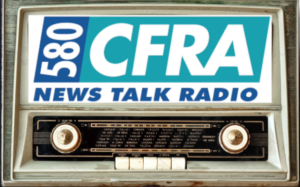Posts Tagged ‘Kelly Fremon Craig’
Saturday, February 24th, 2024
Watch the whole thing HERE
Tags: Aaron Ashmore , Ajahnis Charley , Alan Ritchson , Beanie Feldstein , Bill Camp , Catherine De Seve , Charlie Gillespie , Colman Domingo , comedy road film , comedy-drama , Dane Clark , drama , Drive-Away Dolls , E. Fegan DeCordova , Ethan Coen , Geraldine Viswanathan , Hilary Swank , Jon Gunn , Kelly Fremon Craig , Linsey Stewart , Margaret Qualley , Matt Damon , Meg Tilly , Michaela Watkins , Nancy Travis , Neha Kohli , Ordena Stephens , Ordinary Angels , Oscar Hsu , Pedro Pascal , Rainbow Sun Francks , Sandy Jobin-Bevans , Sara Waisglass , Sorika Wolf , Suze , Tamala Jones , Tricia Black , Tricia Cooke Film Review | Comments Off on CTV NEWS AT 11:30: MORE MOVIES AND TV SHOWS TO STREAM THIS WEEKEND!
Friday, February 23rd, 2024
Listen to the whole thing HERE
Tags: Aaron Ashmore , Ajahnis Charley , Alan Ritchson , Beanie Feldstein , Bill Camp , Catherine De Seve , Charlie Gillespie , Colman Domingo , comedy road film , comedy-drama , Dane Clark , drama , Drive-Away Dolls , E. Fegan DeCordova , Ethan Coen , Geraldine Viswanathan , Hilary Swank , Jon Gunn , Kelly Fremon Craig , Linsey Stewart , Margaret Qualley , Matt Damon , Meg Tilly , Michaela Watkins , Nancy Travis , Neha Kohli , Ordena Stephens , Ordinary Angels , Oscar Hsu , Pedro Pascal , Rainbow Sun Francks , Sandy Jobin-Bevans , Sara Waisglass , Sorika Wolf , Suze , Tamala Jones , Tricia Black , Tricia Cooke Film Review | Comments Off on NEWSTALK TONIGHT WITH JIM RICHARDS: DOES RICHARD CROUSE LIKE THESE MOVIES?
Friday, February 23rd, 2024
Watch thew whole thing HERE
Tags: Aaron Ashmore , Ajahnis Charley , Alan Ritchson , Beanie Feldstein , Bill Camp , Catherine De Seve , Charlie Gillespie , Colman Domingo , comedy road film , comedy-drama , Dane Clark , drama , Drive-Away Dolls , E. Fegan DeCordova , Ethan Coen , Geraldine Viswanathan , Hilary Swank , Jon Gunn , Kelly Fremon Craig , Linsey Stewart , Margaret Qualley , Matt Damon , Meg Tilly , Michaela Watkins , Nancy Travis , Neha Kohli , Ordena Stephens , Ordinary Angels , Oscar Hsu , Pedro Pascal , Rainbow Sun Francks , Sandy Jobin-Bevans , Sara Waisglass , Sorika Wolf , Suze , Tamala Jones , Tricia Black , Tricia Cooke Film Review | Comments Off on YOU TUBE: THREE MOVIES/THIRTY SECONDS! FAST REVIEWS FOR BUSY PEOPLE!
Friday, February 23rd, 2024
Watch the whole thing HERE
Tags: Aaron Ashmore , Ajahnis Charley , Alan Ritchson , Beanie Feldstein , Bill Camp , Catherine De Seve , Charlie Gillespie , Colman Domingo , comedy road film , comedy-drama , Dane Clark , drama , Drive-Away Dolls , E. Fegan DeCordova , Ethan Coen , Geraldine Viswanathan , Hilary Swank , Jon Gunn , Kelly Fremon Craig , Linsey Stewart , Margaret Qualley , Matt Damon , Meg Tilly , Michaela Watkins , Nancy Travis , Neha Kohli , Ordena Stephens , Ordinary Angels , Oscar Hsu , Pedro Pascal , Rainbow Sun Francks , Sandy Jobin-Bevans , Sara Waisglass , Sorika Wolf , Suze , Tamala Jones , Tricia Black , Tricia Cooke Film Review | Comments Off on CTV NEWS TORONTO AT FIVE WITH ZURAIDAH ALMAN: RICHARD ON WHAT TO WATCH!
Friday, February 23rd, 2024
Watch the whole thing HERE
Tags: Aaron Ashmore , Ajahnis Charley , Alan Ritchson , Beanie Feldstein , Bill Camp , Catherine De Seve , Charlie Gillespie , Colman Domingo , comedy road film , comedy-drama , Dane Clark , drama , Drive-Away Dolls , E. Fegan DeCordova , Ethan Coen , Geraldine Viswanathan , Hilary Swank , Jon Gunn , Kelly Fremon Craig , Linsey Stewart , Margaret Qualley , Matt Damon , Meg Tilly , Michaela Watkins , Nancy Travis , Neha Kohli , Ordena Stephens , Ordinary Angels , Oscar Hsu , Pedro Pascal , Rainbow Sun Francks , Sandy Jobin-Bevans , Sara Waisglass , Sorika Wolf , Suze , Tamala Jones , Tricia Black , Tricia Cooke Film Review | Comments Off on RICHARD’S WEEKEND MOVIE REVIEWS FROM CP24! FRIDAY FEBRUARY 23, 2024.
Friday, February 23rd, 2024
Watch the whole thing HERE
Tags: Aaron Ashmore , Ajahnis Charley , Alan Ritchson , Beanie Feldstein , Bill Camp , Catherine De Seve , Charlie Gillespie , Colman Domingo , comedy road film , comedy-drama , Dane Clark , drama , Drive-Away Dolls , E. Fegan DeCordova , Ethan Coen , Geraldine Viswanathan , Hilary Swank , Jon Gunn , Kelly Fremon Craig , Linsey Stewart , Margaret Qualley , Matt Damon , Meg Tilly , Michaela Watkins , Nancy Travis , Neha Kohli , Ordena Stephens , Ordinary Angels , Oscar Hsu , Pedro Pascal , Rainbow Sun Francks , Sandy Jobin-Bevans , Sara Waisglass , Sorika Wolf , Suze , Tamala Jones , Tricia Black , Tricia Cooke Film Review | Comments Off on RICHARD’S CTV NEWSCHANNEL WEEKEND REVIEWS FOR FRIDAY FEBRUARY 23, 2024!
Friday, February 23rd, 2024
Watch the whole thing HERE
Tags: Aaron Ashmore , Ajahnis Charley , Alan Ritchson , Catherine De Seve , Charlie Gillespie , comedy-drama , Dane Clark , drama , E. Fegan DeCordova , Hilary Swank , Jon Gunn , Kelly Fremon Craig , Linsey Stewart , Meg Tilly , Michaela Watkins , Nancy Travis , Neha Kohli , Ordena Stephens , Ordinary Angels , Oscar Hsu , Rainbow Sun Francks , Sandy Jobin-Bevans , Sara Waisglass , Sorika Wolf , Suze , Tamala Jones , Tricia Black CP24 | Comments Off on RICHARD’S CP24 WEEKEND REVIEWS & VIEWING TIPS! FRIDAY FEBRUARY 23, 2024.
Friday, February 23rd, 2024
Listen to the whole thing HERE
Tags: Aaron Ashmore , Ajahnis Charley , Alan Ritchson , Beanie Feldstein , Bill Camp , Catherine De Seve , Charlie Gillespie , Colman Domingo , comedy road film , comedy-drama , Dane Clark , drama , Drive-Away Dolls , E. Fegan DeCordova , Ethan Coen , Geraldine Viswanathan , Hilary Swank , Jon Gunn , Kelly Fremon Craig , Linsey Stewart , Margaret Qualley , Matt Damon , Meg Tilly , Michaela Watkins , Nancy Travis , Neha Kohli , Ordena Stephens , Ordinary Angels , Oscar Hsu , Pedro Pascal , Rainbow Sun Francks , Sandy Jobin-Bevans , Sara Waisglass , Sorika Wolf , Suze , Tamala Jones , Tricia Black , Tricia Cooke Film Review | Comments Off on CKTB NIAGARA REGION: THE TIM DENIS SHOW WITH RICHARD CROUSE ON MOVIES!
Friday, February 23rd, 2024
Listen to the whole thing HERE
Tags: Aaron Ashmore , Ajahnis Charley , Alan Ritchson , Beanie Feldstein , Bill Camp , Catherine De Seve , Charlie Gillespie , Colman Domingo , comedy road film , comedy-drama , Dane Clark , drama , Drive-Away Dolls , E. Fegan DeCordova , Ethan Coen , Geraldine Viswanathan , Hilary Swank , Jon Gunn , Kelly Fremon Craig , Linsey Stewart , Margaret Qualley , Matt Damon , Meg Tilly , Michaela Watkins , Nancy Travis , Neha Kohli , Ordena Stephens , Ordinary Angels , Oscar Hsu , Pedro Pascal , Rainbow Sun Francks , Sandy Jobin-Bevans , Sara Waisglass , Sorika Wolf , Suze , Tamala Jones , Tricia Black , Tricia Cooke Film Review | Comments Off on CFRA IN OTTAWA: THE BILL CARROLL MORNING SHOW MOVIE REVIEWS!
 I appear on “CTV News at 11:30” with anchor Andria Case to talk about the best movies and television to watch this weekend, including the films “Drive-Away Dolls” from director Erthan Coen, the Hillary Swank film “Ordinary Angels” and the dramedy “Suze”
I appear on “CTV News at 11:30” with anchor Andria Case to talk about the best movies and television to watch this weekend, including the films “Drive-Away Dolls” from director Erthan Coen, the Hillary Swank film “Ordinary Angels” and the dramedy “Suze”






